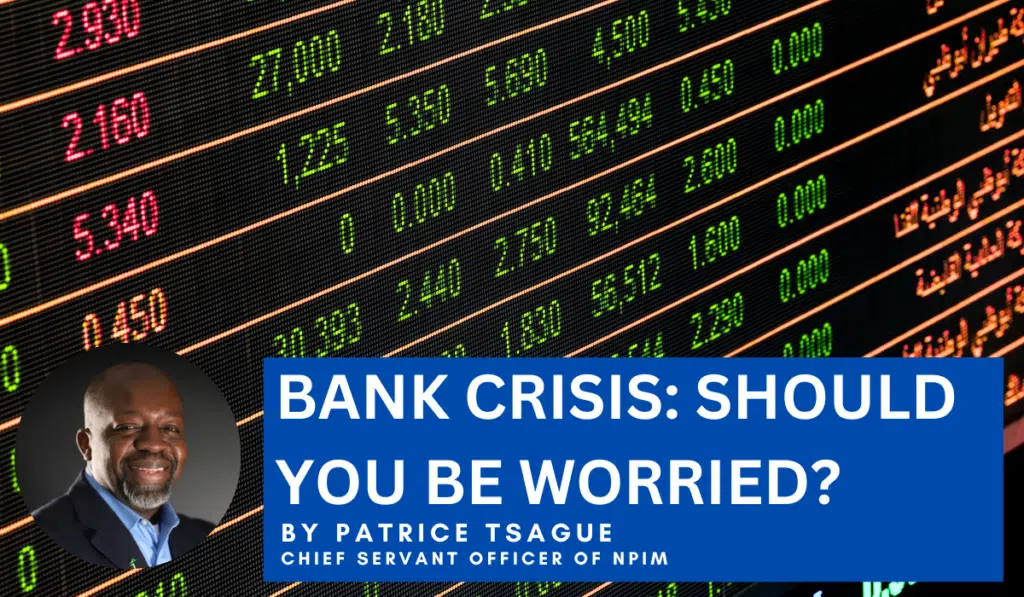On March 10, 2023, the failure of the biggest bank in US history sparked a banking financial crisis that has so far caused one bank to shut down, another to be purchased by a larger bank, and two more rescued by extreme measures by the US government and a larger bank. We are in the midst of a bank crisis.
What happened?
According to CNN Business:
Friday, March 10 — The US government’s Federal Deposit Insurance Corporation (FDIC) took control of SVB. It was the biggest banking collapse in America since Washington Mutual in 2008. The wheels started to come off 48 hours earlier when the bank took a multibillion-dollar loss cashing out US government bonds to raise money to pay depositors. It tried — unsuccessfully — to sell shares to shore up its finances. That triggered the panic that led to its downfall.
Sunday, March 12 — The FDIC shut down Signature Bank after a run on its deposits by customers who were spooked by the implosion of SVB. Both banks had an unusually high ratio of uninsured deposits to fund their businesses.
Wednesday, March 15 — After watching shares in Credit Suisse (CS) collapse by as much as 30%, Swiss authorities announced a backstop for the country’s second-biggest bank. It calmed the immediate market panic, but the global player is not out of the woods yet. Investors and customers are worried that it doesn’t have a credible plan to reverse a long-term decline in its business.
Thursday, March 16 — First Republic Bank was teetering on the brink as customers withdrew their deposits. In a meeting in Washington, US Treasury Secretary Janet Yellen and Jamie Dimon, the CEO of America’s biggest bank, drew up plans for a private sector rescue. The result was an agreement with a group of American lenders to deposit tens of billions of dollars of cash into First Republic to staunch the bleeding.
Sunday, March 19 — Switzerland’s biggest bank, UBS, agreed to buy its ailing rival Credit Suisse in an emergency rescue deal aimed at stemming financial market panic.
How does this impact you?
Unless you have deposits in those banks of more than $250K or own their stocks, there is little to no impact on you. Also, if you own stocks in small banks, you should see a decrease in stock value in your portfolio due to the fear that this is not isolated to these banks but could be indicative of small banks in general.
David Witter, Nehemiah Entrepreneurship Community member and CEO of Financial Harvest Wealth Advisors, who will be speaking at the upcoming Nehemiah Best Practice Tour and Conference, provided a great video blog that gives a great explanation of what happened and its impact on your investment.
What about the impact on your business?
Here are the 4 key impacts on your business:
- The cost of borrowing will go up
- The bank lending process will be tightened, and this will make borrowing more difficult
- If your business reserves are in investments that have small banks in their portfolio, they will decrease in value
- The overall cost of goods and services will stay up for longer or keep going up due to the lengthening inflation
What should you do about it?
You should:
- Seek God for wisdom and discernment through prayer and study of His Word so you may set your affection on those things that are above and not beneath. Remember the lessons you learned in the Biblical Entrepreneurship Course about Biblical Economics.
- Employ best business practices. You may not be able to control macroeconomics, but you can control what you do. *Attending the Nehemiah Best Practice Tour and Conference will provide you with great tools
- Keep your deposit at less than $250K in any particular bank or no more than whatever the insurance limit is in your country
- Keep some cash on hand. The amount depends on your living expenses and your operating expenses. This is a good habit at anytime
- Stay in the community. Connect and engage with entrepreneurship and church communities that share your values. The Nehemiah Entrepreneurship Communities is a growing community of Kingdom Business owners who are committed to building companies that honor Christ while providing value for customers and all stakeholders engaged in the business.
Remember Matthew 6:31-34:
“Therefore do not worry, saying, ‘What shall we eat?’ or ‘What shall we drink?’ or ‘What shall we wear?’ For after all these things the Gentiles seek. For your heavenly Father knows that you need all these things. But seek first the kingdom of God and His righteousness, and all these things shall be added to you. Therefore do not worry about tomorrow, for tomorrow will worry about its own things. Sufficient for the day is its own trouble.”
Join other Kingdom Business Stewards from around the world next week and me in Orlando at the Nehemiah Best Practice Tour and Conference as we dig deeper into how to survive business crises and accelerate the growth of our businesses, no matter your business stage.
For more great articles that provide you with insights to help you with your entrepreneurship journey from discovery to succession, click HERE to view Nehemiah Project International Ministries’ (NPIM’s) library of Kingdom Business Resources. Interested to know more about upcoming events and educational opportunities offered by NPIM? Click HERE!
